Croatia - a Piece of European Humanism
Adelina Marini, September 18, 2015
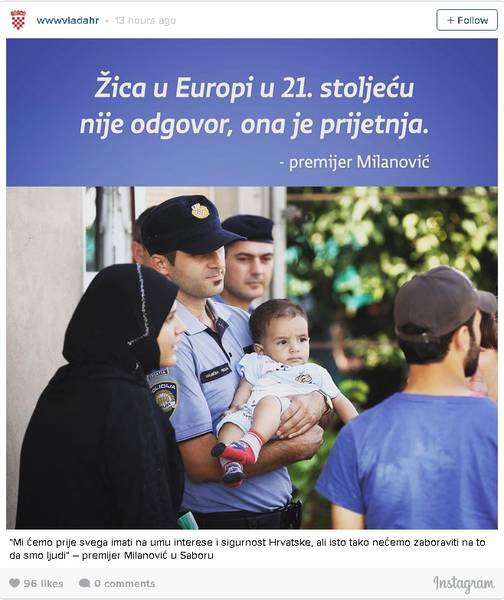 The first collision of Croatia with the Western Balkans refugee flow on September 16 showed the total opposite of the EU face refugees saw in neighbouring Hungary. While at the closed Hungarian-Serbian border tension was growing between the hundreds of blocked refugees and police, the first arrivals at the Serbian-Croat border Šid-Tovarnik were greeted warmly and in a civilised manner. At the background of footage of tear gas being used by Hungarian police, barricaded behind a solid wire fence, there was a photo that gained popularity in social media and the TV exchange of a Croatian policeman holding a refugee’s baby. Croatia became part of the refugees’ route after earlier this week Hungary started enforcing new, stricter measures of border control, including arrests and en masse returns of refugees into Serbia.
The first collision of Croatia with the Western Balkans refugee flow on September 16 showed the total opposite of the EU face refugees saw in neighbouring Hungary. While at the closed Hungarian-Serbian border tension was growing between the hundreds of blocked refugees and police, the first arrivals at the Serbian-Croat border Šid-Tovarnik were greeted warmly and in a civilised manner. At the background of footage of tear gas being used by Hungarian police, barricaded behind a solid wire fence, there was a photo that gained popularity in social media and the TV exchange of a Croatian policeman holding a refugee’s baby. Croatia became part of the refugees’ route after earlier this week Hungary started enforcing new, stricter measures of border control, including arrests and en masse returns of refugees into Serbia.
Croatia has been preparing for this scenario for a long time. Regardless, reality very quickly outran preliminary forecasts. Croatian authorities expected around 500 people the first day, but as of Thursday morning they were already almost six thousand. With the first incoming refugees came the first positive signals from politicians, media, and citizens. In the Sabor (Croatian Parliament) Prime Minister Zoran Milanović, who has long expressed favourable attitude on the subject, sent a clear signal to society and the refugees: “We are ready to accept these people, to reroute them if you like, regardless of faith, nationality, skin colour, to whichever country they wish to go to. These people are here, they want to work, to create. They do not want to come to Croatia, they don’t want in Hungary either. They can pass through Croatia. We are thinking about security, but let us not forget we are human. The policy of Budapest is dangerous and cruel. Barbed wire in the 21st century is not an answer, but a threat”, he said during the regular PM questions.
The previous evening in the TV programme “Open” of Croatian national television Deputy PM and Minister of Internal Affairs Ranko Ostojić also demonstrated humanity and understanding towards refugees. Moreover, he linked this directly to Europeanism: “I do not accept the idea that multiculturalism may not succeed, for this will mean that Croatia refuses to be part of Europe”. Answering the questions why Germany first opened the door and then reinstated strict border control Mr Ostojić explained that it is for a very simple reason. After the decision to welcome refugees freely thousands of people gathered at the border with Austria, whose processing requires time. He refused to “fall” for the provocations of some Serbian media that implied that Serbia was deliberately pointing the refugee flow towards Croatia. He asked that facts and only facts be discussed and stated that every sentence should be well considered.
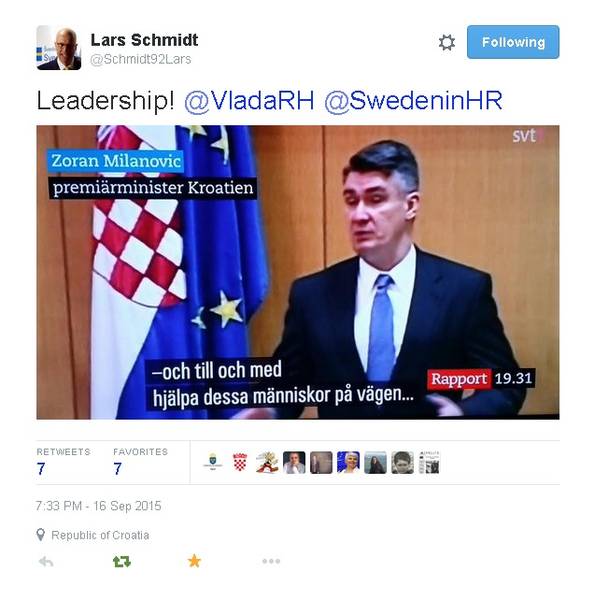
During Wednesday, while media were counting the incoming refugees, journalists and analysers kept reminding the history of the 20th century when at several occasions Croatia (then part of Yugoslavia) accepted refugees – from WWII, from the Hungarian and Prague Spring, from the wars accompanying the disintegration of former Yugoslavia. They all put accent on the Hungarians, tens of thousands of whom were given asylum in Croatia and all over Yugoslavia, regardless of the fact that right at this moment the former federation was in a process of warming-up relations with Moscow. Some columnists ended with the words: “And this is how they repay for it.” Many reminded something else that was often mentioned in Croatian public domain over the past weeks. It was exactly during the Yugoslav wars that Croatia, with its population of four and a half million, sheltered close to a million refugees.
As early as that same evening, during the TV live feeds, it became clear that expectations for only 500 refugees over the first day had been exceeded almost threefold. Regardless, attitudes of media, politicians, and local citizens remained positive. Many of the interviewed citizens of the small village of Tovarnik, which lies at the border with Serbia and was turned into the first reception centre for refugees, expressed understanding and remembered how not so long ago it was them that needed help. If need be, we will share our last piece of bread but these people are not running from anything good, they said. The Ministry of Internal Affairs created an efficient information organisation. At the Ministry’s web page data for the number of entries is being refreshed every couple of hours. The Tweeter profile of the government constantly gives information, including in English.
Media coverage has been balanced, with no panic or hysteria. It is important to note that in the predominant number of cases journalists spoke of EU borders – both in the case of Hungary and of Croatia. The balanced and humane media behaviour surprised even journalists themselves, who expressed their pride of the manner in which the refugees were welcomed. Satisfaction could be read on Thursday in many of the Croatian media. There was a positive response from abroad as well. Apart from international media, Croatia was commended by the Swedish ambassador in Zagreb, Lars Schmidt, who tweeted a screen shot from Swedish TV of PM Milanović’s speech at the Sabor, accompanied by a single word “Leadership!”. From the start of the day a page was created on Facebook aiming to aid refugees during their stay and travel through Croatia. The page is named “Dear refugees, Welcome to Croatia” and gives information in English, Croatian, and Arabic. A map was published with the safe routes and with a warning that outside official roads there are still unexploded mines from the war.
Pre-election risks
Amid the excitement of the first day there were also sober evaluations and also ventures into political territory. Some journalists, while praising the Croats’ behaviour, pointed out that this is only the first day and the refugee flow has not yet reached the scale with which Greece, Serbia, Macedonia, Italy, Hungary, Austria, and Germany are dealing. In media and social networks’ commentaries, along with the praises from neighbouring states of the type “Well done, neighbours”, also came warnings: “Wait until they become thousands”. There is clear risk that the subject will enter the election campaign. Such expectations were created by the leader of the largest opposition party, the Croatian Democratic Union (HDZ), Tomislav Karamarko. He and his party kept silent on the refugee subject until recently. Lately, the silence was broken with a focus on the lack of a government strategy for dealing with the refugee problem. PM Milanović answered the 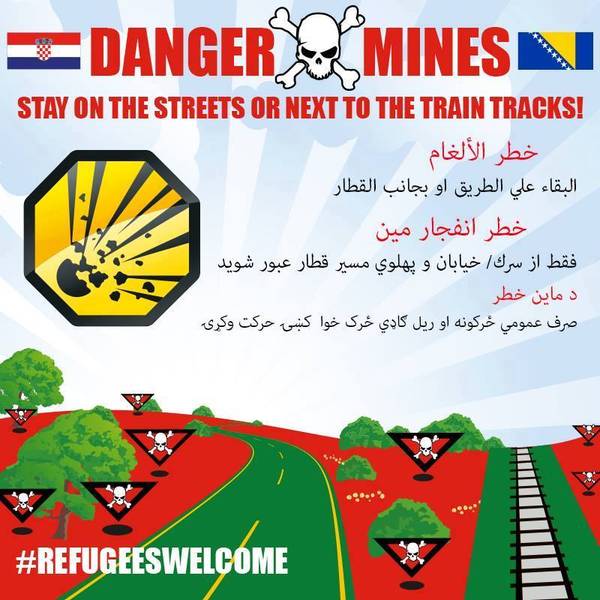 criticism by saying that the EU also has no common strategy and it is impossible for Croatia to have one before a common approach is agreed on in the Union.
criticism by saying that the EU also has no common strategy and it is impossible for Croatia to have one before a common approach is agreed on in the Union.
After the prime minister's questions and answers session on Wednesday morning Mr Karamarko criticised the PM for his words that the refugees are welcome to stay and work in Croatia. According to Tomislav Karamarko, this is irresponsible considering thousands of Croats are currently unemployed.
More criticism came from the chief of Civilian Protection office in Vukovar-Srijem County Zdravko Kelić. He was outraged that the government has not fulfilled its obligation to provide enough capacity for processing of all the incoming. He also reminded that the county is financing the entire operation on its own. He did not hide his fear from the growing numbers, while apologising for it. At its Thursday meeting the government set up a special taskforce for the refugees to help coordinate the refugee flow better.
Kindness before legislation?
The kindness and humanity of Croats is only one side of the medal. The other is European legislation. On Wednesday, when the numbers were still low, Croatian PM Milanović proposed the creation of a refugee corridor with Slovenia to ease the refugees’ travel to Austria, Germany, and beyond. Later Slovenia dismissed the idea. According to the Dublin Regulation, refugees must be sheltered by the first country they come into. There, they must be registered and only there are they to wait to be granted asylum or returned. Croatia says its capacity at the moment is to house 3000 people. There were reports that in order to gain maximum housing capacity the migrants currently residing in the country awaiting status were asked to leave.
European legislation has been wreaking havoc within the European Union, especially since the Arab Spring, when countries at the front lines started to run into hundreds of thousands of refugees and migrants per year. At the moment, there is no agreement in the EU neither on the proposal for quota distribution of people that came into the front line states, nor has a discussion of changing the Dublin Regulation started.
At the same time struggling states like Greece, Italy, and the transit states with the exception of Hungary began letting refugees through unhindered, without even registering them. The emergency meeting of ministers of internal affairs did not end with an agreement for the distribution of 120 000 refugees currently in Greece, Italy, and Hungary, which was sharply criticised by the European Parliament. On September 22nd there is going to be another meeting, but the Minister for Immigration and Asylum of Luxembourg Jean Asselborn remained sceptical. At the emergency plenary session in Brussels he admitted that this would be one very difficult meeting. Such was the meeting on September 14th as well. Meanwhile, lacking a common decision and with tension at the Hungarian border growing, member states one after the other forsake 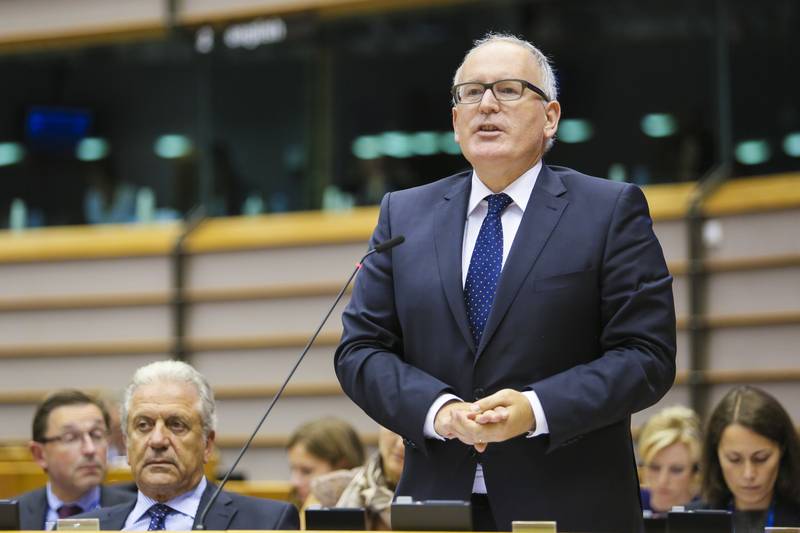 the Union rules for the sole purpose of alleviating their own burden and often for political dividends. The EU is currently divided into transit countries and destinations.
the Union rules for the sole purpose of alleviating their own burden and often for political dividends. The EU is currently divided into transit countries and destinations.
There are, however, at the background of a disintegrating European unity, those manifestations of humanity, compassion, and understanding, which are the sole light of hope that Europeanism has not totally disappeared. The question is whether this last light of European humanism will die with the coming of winter and the thinning of national budgets, and in some cases the coming parliamentary elections. Speaking to MEPs First Vice-President of the EC Frans Timmermans warned that the EU itself was in danger. “Those of you who know Game of Thrones will know the expression 'Winter is coming'. It is meant quite literally and it is meant metaphorically. I think this expression can be applied to the situation the European Union is in now vis-à-vis the refugees. Winter is coming, quite literally. The winter may also be coming metaphorically for the European Union if we are incapable of action in the next couple of days and weeks”, he said.
Translated by Stanimir Stoev
 Kolinda Grabar-Kitarovic | © KGK
Kolinda Grabar-Kitarovic | © KGK Jozo Rados | © European Parliament
Jozo Rados | © European Parliament Aleksandar Vucic, Andrej Plenkovic | © Vlada RH
Aleksandar Vucic, Andrej Plenkovic | © Vlada RH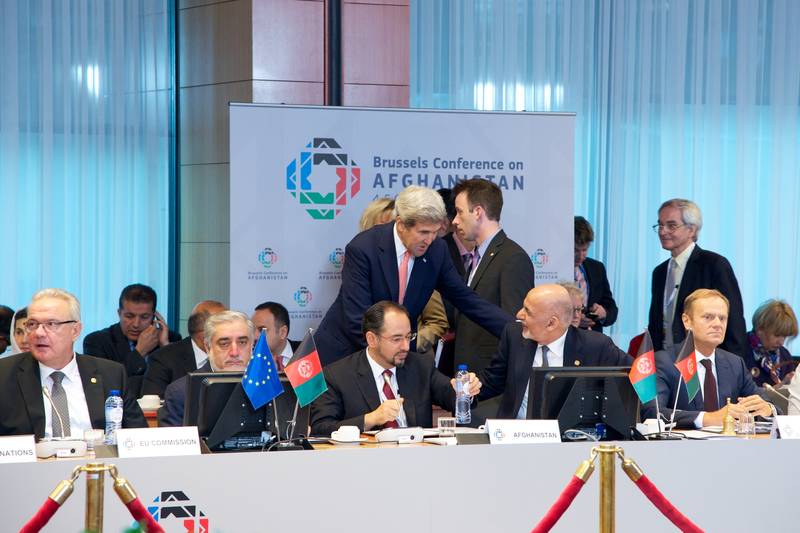 | © Council of the EU
| © Council of the EU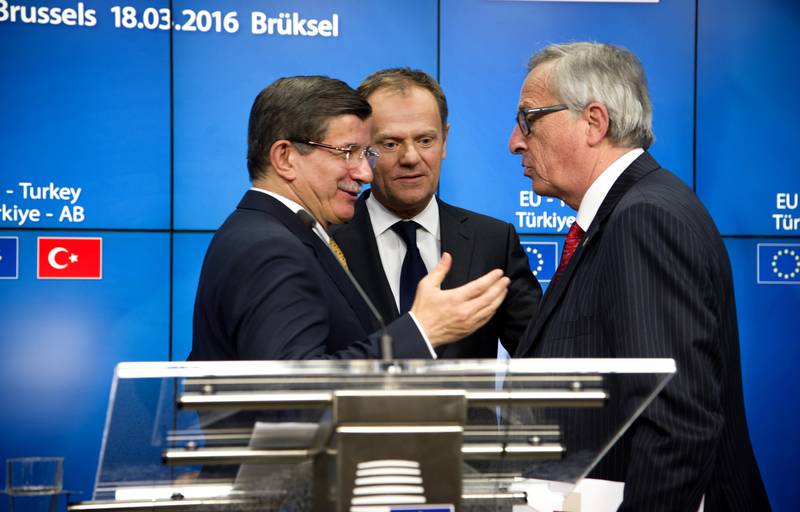 Davutoglu, Tusk, Juncker | © Council of the EU
Davutoglu, Tusk, Juncker | © Council of the EU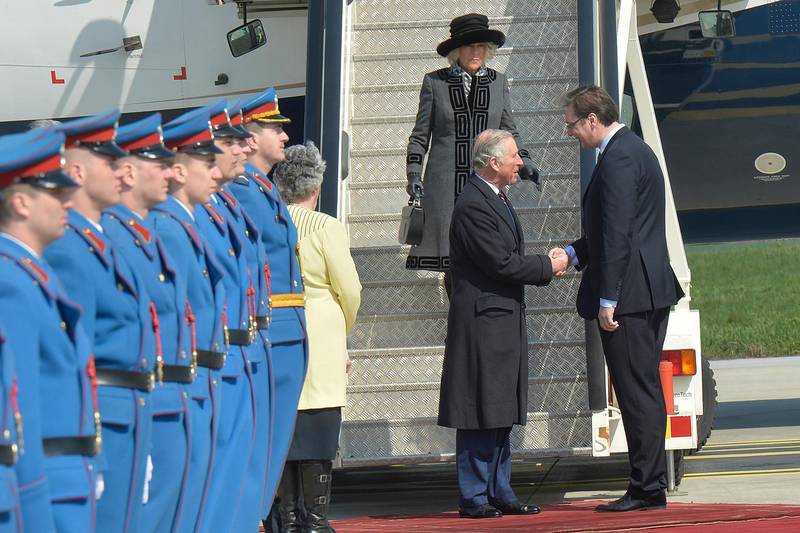 | © Vlada RS
| © Vlada RS